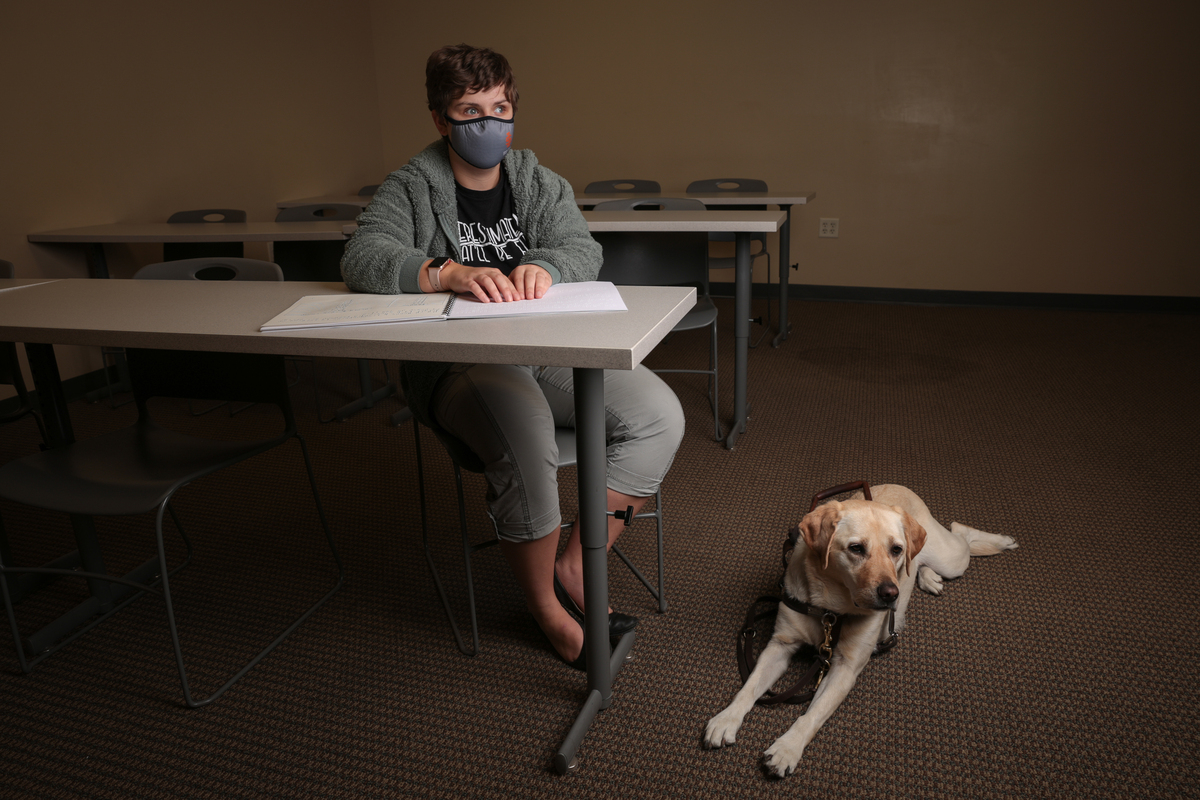ISU Disability Services Spotlight: Preventing Service Dog Discrimination and a Guide to Service Dog Etiquette
September 1, 2022

It’s important for the campus community to know the difference between service dogs and emotional support animals, and ISU now has policies in place for preventing service dog discrimination.
Under the Americans with Disabilities Act (ADA), a service animal is defined as a dog that has been individually trained to do work or perform tasks for an individual with a disability. The tasks performed by the dog must be directly related to the person's disability.
Emotional support dogs are not defined as service animals under the ADA. Under ISU policy, emotional support animals are not permitted to attend classes or activities, including athletic events and other policies are in place regarding them.
“Emotional support animals have their place, but there is no regulation in place that they have to meet certain standards,” said Quincie Mattick, an ISU student who is blind and has a service dog named Tessa. “Sadly, in some cases, they are not trained at all, and that can sometimes put our assistive dogs – that are actually very needed for completing tasks – in danger. If they (emotional support animals) are well-trained, I don’t have a problem, but if they are attacking my dog, I definitely do.”
Mattick, who is a senior from Colorado Springs, Colorado, majoring in health sciences, has had Tessa for four years. Tessa is 6 years old and was trained for two years. Mattick said she has friends who are blind who have had their service dogs attacked by emotional support animals, especially in airports. In addition to potentially endangering service animals, emotional support dogs are sometimes giving trained service dogs a bad rap.
“Because some people assume ESA (emotional support animals) are actually service animals, but that is not the case, it has started ruining it for us,” Mattick said. “It is frustrating, they have kind of given service dogs a bad reputation and we have to fight harder for access to places and that has been a struggle.”
According to the new ISU policy for preventing service dog discrimination, in situations where it is not obvious that the dog is a service animal, the ADA allows only two specific questions to be asked to the handler:
1) “Is your dog a service animal required because of a disability?”
2) “What work or task has the dog been trained to perform?”
According to the policy, it is not acceptable or respectful to require identification or certification or ask about the specific type and nature of the disability. It should not be asked to have the service animal demonstrate training. The verbal statement of the individual should generally be taken as sufficient proof. If there is reason to question the legitimacy of a claim at ISU, Disability Services should be advised, and Disability Services may be able to request additional information. Once sufficient proof has been provided via a verbal statement, a service animal must be allowed to remain unless the following circumstances occur: 1) the service animal is not under the control of the handler; 2) there is a risk to the public health and safety of others, or 3) the service animal is not housebroken.
As noted above, emotional support animals are not permitted to attend ISU classes or activities including athletic events. However, emotional support animals can potentially be a reasonable accommodation for housing or travel.
Additionally, pets and/or companion animals are not allowed on campus unless permission is first obtained from ISU Public Safety. Individuals can be asked to show proof of permission from Public Safety for pets. If you have any questions or would like further training, contact Disability Services at (208) 282-3599 or disabilityservices@isu.edu or the Office of General Counsel at (208) 282-3234.
Service Dog Etiquette - Tips for Interacting with Service Dogs
Mattick and ISU Disability Services Director Karina Mason Rorris offered advice about interacting with service dogs. In short, it is best not to interact with a service dog unless you have asked permission to do so, Rorris said.
Mattick expounded on why this matters.
“When service dogs are working, distracting them is a safety risk, not just an inconvenience,” Mattick said.
Mattick said she has had people make a “tch-tch” or other sounds to Tessa, causing her dog to become distracted.
“And if she (Tessa) gets distracted, I have to correct her and it is not fair to her,” Mattick said.
It can also be dangerous.
“I had someone call to Tessa one time and she ended up pulling me out into a road,” she continued. “That is a safety risk.”
Categories:
